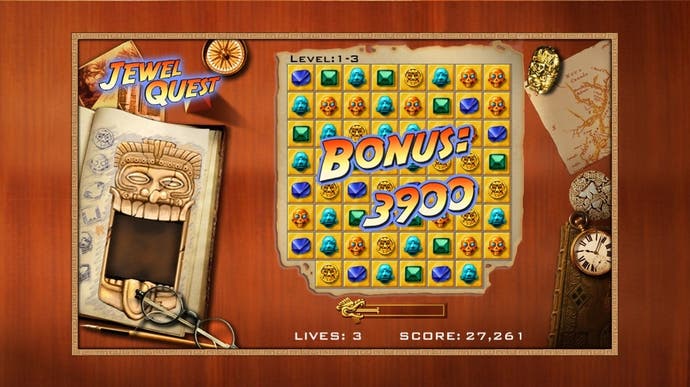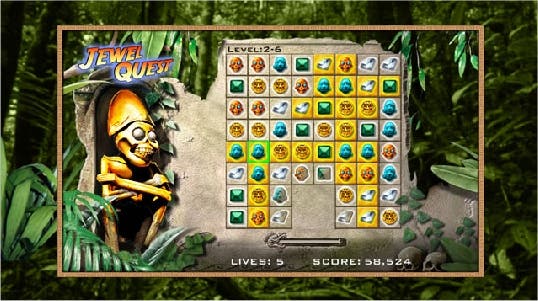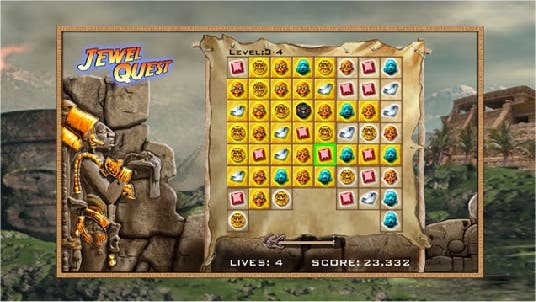Jewel Quest
Can you dig it?
It'd be easy to write that it'd be easy to dismiss Jewel Quest as yet another Bejeweled clone, but that would be lazy - spend more than half an hour with it and it's fairly obvious that it's actually put an interesting slant on it. Instead I will dismiss the allusion-to-the-ease-of-hapless-dismissiveness approach, and focus on the other obvious intro fodder: the incredibly brilliant story that nicks all sorts of bit from the Mayans and uses them to justify tile-twizzling.
"In the distance I can spot Tleyquiyahuillo, The Temple of the Third Sun. I must reach it! But the winds of time have ravaged this next grid... Some squares are missing altogether! I must match carefully here," writes the person who's supposedly solving all these Bejeweled-inspired puzzles. Later it's "Welcome to Tleyquiyahuillo, twinned with Llanfairpwllgwyngyllgogerychwyrndrobwllllantysiliogogogoch." Who knew the Mayans had so much in common with the Welsh! [Stop making things up. - Ed]
"If I'm not mistaken, the creature who emerges is the dreaded Chimalmat, she with the eyes of ruby and lust of vengeance. The Popol Vuh speaks about how she birthed Cabrakan and Zipacna. As vicious as she is known to be, surely she will reward me for freeing her children." Later your quest descends into the selfish pursuit of the "Stelae", which is apparently some sort of tablet containing the meaning of life made out of molten aluminium. Or something. The "Popol Vuh" remains something of a mystery (i.e. I got to the point where even Googling these things became boring).
Fortunately Jewel Quest is not exactly story driven, although I certainly enjoyed the little interludes - at least until they gave up even trying for a consistent narrative and just starting pasting Chuchill quotes, giving the game the air of a spam email. "Endeavor Societies church addition Christian pledge following special ways which they forward ever held before member For sake character future success Tleyquiyahuillo etc." Insert game. Poor show. But, as I say, none of this is the point. The point is to manipulate squares on a grid, each of which has a little "relic" on it, so that you can create lines of three or more identical relics, which then disappear. As with Bejeweled/Zoo Keeper/et al, you can only swap around two adjacent tiles, and you can only do so if you're creating a line of three or more.

The difference between Jewel Quest and the games whose central mechanic it's riffing on is that here you're not trying to reach a score or clear the decks (indeed, you can't clear them), or even trying to top up a timer. Instead, you're trying to create a line of relics on every square on the grid. Whenever you get some relics to vanish, the squares underneath them change to gold, and you clear each stage by turning the whole lot to gold, which isn't as easy as it sounds.
Well, actually, to begin with it is as easy as it sounds. In fact, if you've any experience of the other games I've mentioned, it's boringly simple, and you'll sit there wondering what the fuss is about, and bemoaning silly little oversights. For example, you swap tiles by selecting one with A and pushing the direction you want to send it on the analogue stick or d-pad, but you can't perform these actions while relics are disappearing or chain-reacting. Zoo Keeper on the DS's brilliant fluidity owed so much to being able to move other tiles while things were still unfolding elsewhere on the grid - given that these little tile-swappers are practically a genre of their own now, you'd think they'd be nicking each other's best ideas (particularly since the fonts used in Jewel Quest suggest iWin's not averse to casual thievery).

But the niggles soon become a footnote to what turns out to be a very enjoyable little puzzler, as the developer introduces grids with twists (and holes, and burrows), forcing you to scheme appropriate chain reactions to convert difficult-to-reach squares to gold. For example, you might find yourself up against a grid with a line of three squares stretching off the bottom. In order to convert the deepest of the squares, you need to line up a reaction that'll send appropriate relics into the depths when the ones below them disappear. Simply vanishing relics wherever you see them isn't good enough to make any concerted progress.
iWin claims that you get 180 levels for your money, although actually there's quite a bit of repetition. The variation comes from the addition of fiendish obstacles, like immovable "partially buried" relics that you need to work around, creating a line for them to become part of by arranging fitting chain reactions and so on. Only then do they become manoeuvrable themselves, so in effect you have to play them twice - not something that you'll find easy when they're buried deep in hard to reach places. You're constantly up against an emptying hourglass (well, a little stone head whose tongue's retracting) too, and you can't do anything about its progress, so as things become more complicated there's a definite sense of mounting pressure.

In terms of value, the 360 version's cheaper than the Flash-based version (which you can try out on Shockwave.com to get a feel for the absolute basics), and you get the added benefits of the "Gamerpoints" you'll gain for hitting certain milestones on the Xbox 360, like building up a score of 500,000 in a single session (or an interrupted one; there's a fairly generous save system here) without losing all your lives. On the other hand, 800 Microsoft points is about £6.80 in real money, and Jewel Quest's rather single-minded approach might put you off spending that.
Worth buying, then? Really it depends what you think of when someone says "puzzle game". Jewel Quest is about planning ahead rather than reacting; the pace is deliberate rather than manic. It's Chess next to Zoo Keeper's Operation. It doesn't evoke any particularly exciting adjectives, but it did swallow most of my weekend - and gave me all sorts of obscure words I might be able to get away with in Scrabble, which is more than most puzzle games do.

